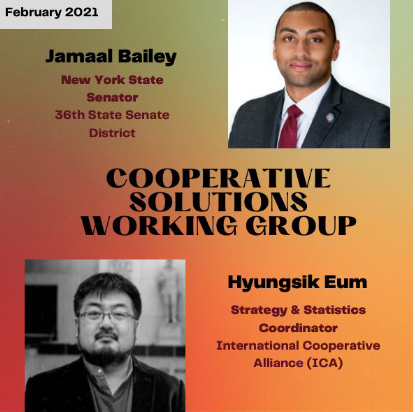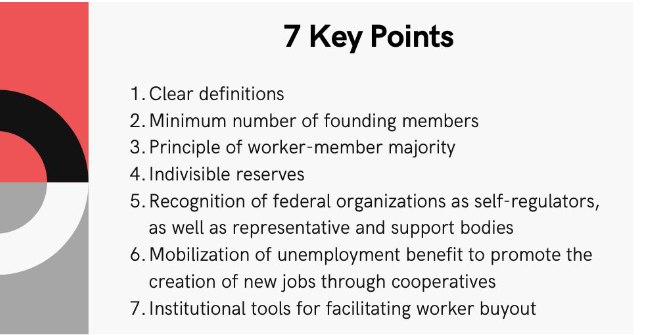“Some of you have heard my story about why I think coops make sense, because they make sense. If you are a part of something, you are going to work harder for it. Full stop.” – – Senator Jamaal Bailey
For the February meeting of our Working Group of the Community and Worker Ownership Project we had the pleasure of hosting NY State Senator Jamaal Bailey and Hyungsik Eum, Strategy and Statistics Coordinator at the International Cooperative Alliance (ICA). Each spoke about enabling legislation through laws and policies to strengthen a cooperative economy. We thank Senator Bailey, graduate of CUNY School of Law, for being a proponent of worker cooperatives as a means of building community wealth right from the start of his term. We celebrate his ongoing support through legislation such as S6794 in 2017 for training and education and currently, S3313, to establish a state employee ownership center at a public university. He shared that S3313 had just passed out of the Senate Sub-committee that very afternoon! You can see Senator Bailey share this here.
We also thank Hyungsik for bringing a global perspective on worker and social cooperatives and for providing guidelines for safe and beneficial employment standards for members in worker cooperatives. Hyungsik started the discussion with an overview of the International Cooperative Alliance and its mission. The ICA currently stands as one of the largest NGOs in the world, representing 1 billion cooperative members. At the core of its mission is to foster the growth and development of cooperatives. His presentation introduced us to a report by CECOP that frames worker cooperatives as a response to Non Standard Employment, (think the gig economy as well as companies with worker-ownership) that often creates challenges for workers in regards to the security of their employment, earnings, and representation. An important point in the discussion addressed the new trend of social cooperatives emerging in Europe, which Hyungsik defined as performing work for the community or broader society. To engage in social and public service work, social cooperatives often operate under a multi-stakeholder governance structure that allows for the interaction of different members from different interests, for a broad shared purpose. (Think community members, worker-owners of the local businesses, tenants and homeowners all in on a Community Land Trust.)
Hyungsik also outlined internationally recognized standards for defining cooperatives to ensure that the status of worker-ownership does not jeopardize hard-fought worker protections. A full set of guidelines produced by the International Labor Office (ILO) in 2018 can be found HERE and a summary of those guidelines can be found in the PowerPoint used during this meeting HERE. Below are seven standards of favorable conditions for cooperatives and enabling legislation, as Senator Bailey and UFCW President Rob Newell each suggested, so we can be sure there are standards in place so that cooperatives are not used as a loophole for worker exploitation.
Ra Criscitiello, a legislative director with SEIU-UHW, offered the working group an explanation on the ways to look at employment status in this 2 minute clip. The discussion continued where Senator Bailey got to hear ideas about how to further support worker cooperatives in the state. Contributions and questions came from all the sectors in the (z)room such as unions, cooperative businesses, cooperative developers, academics, government agencies, lawyers, workplace and community development representatives. He started off by crediting CUNY and Carmen Huertas-Noble, (Coop Hall of Fame Inductee 2020)and professor of CUNY Law at the Community Economic Development Clinic for introducing him to the importance of worker cooperatives towards economic and racial justice. Senator Bailey spoke of the importance of the initiatives in NYC for cooperatives, including the new Owner to Owners Hotline under the campaign Employee Ownership NYC as steps in the right direction to provide support for businesses and workers who endeavor to build community wealth. The collaboration and advocacy work from grassroots organizations as well as community members was centered as essential to the development of any legislation that could be proposed and he invited our collective input.
Tamara Shapiro of the New York City Network of Worker Cooperatives raised the question of how the current legislation being passed can support both those businesses looking to convert to cooperatives as well as startups and the worker cooperatives incorporated as LLCs. The case for large worker cooperatives was raised by Robert Newell from UFCW Local 1500,referencing the challenges in the supermarket sector, where some of the largest employers are members of purchasing cooperatives with a complex set of interests and competing demands to the unionized workers. If these grocery stores were to become worker-owners, President Newell asked, how can the workers exercise power and influence in the purchasing cooperative? This led us back to discuss the idea of multi-stakeholder cooperatives as a possible solution.
To learn of the challenges of how people are employed by their business, remain accountable to their members and to the future generations as a value of mutualism watch the clip here on Multi-stakeholder Cooperatives and Social Cooperatives.
David Hammer from the ICA Group added that a strong case can be made that employee ownership creates a savings opportunity for the state rather than a cost. When considering the number of business owners looking to retire without clear succession plans, employee ownership strategy for the state with the potential of saving jobs can reduce the risk of unemployment for those workers. Shaywal Amin, from 1199SEIU, stressed the importance of the Right to First Refusal within the current legislation as a measure of ensuring the workers of businesses can help with healthy transitions to employee ownership before a company is sold off or closed down. Deborah Olson, lawyer in unions and cooperatives for years, shared her guidance for Right of First Refusal language in legislation to support worker cooperatives in this 1 minute clip.
Senator Bailey ended with a shoutout to Omar Freilla from the Green Worker Cooperatives, who is currently serving on the Just Transition Working Group for the Climate Action Council of NY. As a member of this working group, Omar is working to uplift the importance of worker cooperatives as a vehicle for building community wealth while building for resiliency, and moving away from a segregated workforce in the green economy.
“A cooperative is an autonomous association of persons united voluntarily to meet their common economic, social, and cultural needs and aspirations through a jointly-owned and democratically-controlled enterprise. Those needs and aspirations might be related to the consumption and usage of goods and services (consumer cooperatives, financial service cooperatives, insurance cooperatives, housing cooperatives), production activities (producer cooperatives in agriculture, fishery and retail), as well as work and employment (worker cooperatives). Sometimes, cooperatives have been established to respond to the unmet needs of the local community, by people who want to provide a response to these needs by gathering workers and service beneficiaries, as well as other stakeholders (social cooperatives).” -excerpt from CECOP, 2019, All for One. Response of worker-owned cooperatives to non-standard employment, Brussels.






